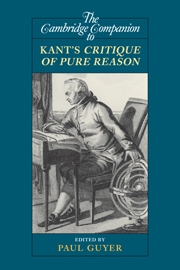Book contents
- Frontmatter
- Introduction
- Part I The Background to the Critique
- Part II The Arguments of the Critique
- 3 The Introduction to the Critique: Framing the Question
- 4 The Transcendental Aesthetic
- 5 The Deduction of the Categories: The Metaphysical and Transcendental Deductions
- 6 The System of Principles
- 7 The Refutation of Idealism and the Distinction between Phenomena and Noumena
- 8 The Ideas of Pure Reason
- 9 The Paralogisms of Pure Reason
- 10 The Antinomies of Pure Reason
- 11 The Ideal of Pure Reason
- 12 The Appendix to the Dialectic and the Canon of Pure Reason: The Positive Role of Reason
- 13 The Transcendental Doctrine of Method
- Part III The Impact of the Critique
- Bibliography
- Index
12 - The Appendix to the Dialectic and the Canon of Pure Reason: The Positive Role of Reason
from Part II - The Arguments of the Critique
Published online by Cambridge University Press: 28 July 2010
- Frontmatter
- Introduction
- Part I The Background to the Critique
- Part II The Arguments of the Critique
- 3 The Introduction to the Critique: Framing the Question
- 4 The Transcendental Aesthetic
- 5 The Deduction of the Categories: The Metaphysical and Transcendental Deductions
- 6 The System of Principles
- 7 The Refutation of Idealism and the Distinction between Phenomena and Noumena
- 8 The Ideas of Pure Reason
- 9 The Paralogisms of Pure Reason
- 10 The Antinomies of Pure Reason
- 11 The Ideal of Pure Reason
- 12 The Appendix to the Dialectic and the Canon of Pure Reason: The Positive Role of Reason
- 13 The Transcendental Doctrine of Method
- Part III The Impact of the Critique
- Bibliography
- Index
Summary
“There must somewhere be a source of positive cognitions that belong in the domain of pure reason, and that perhaps give occasion for errors only through misunderstanding, but that in fact constitute the goal of the strenuous effort of reason” (A 795-6/B 823-4). After 800 pages of a book officially dedicated to critiquing reason, and one that seems up to this point to have disparaged reason to the point that its proper role in knowledge appears to be simply to avoid any involvement, Kant seems finally to begin to speak of reason in encouraging terms. In the first page of the Canon of Pure Reason, Kant holds out the hope that the practical use of reason can succeed where the theoretical use of reason has failed - namely, to satisfy “the unquenchable desire to find a firm footing beyond all bounds of experience” (A 796/B 824). The highest aim of reason concerns “what is to be done”, and the ideas of soul, world, and God have their true value in defending the related morally important claims of immortality of the soul, freedom of the will from natural causality, and the existence of God (A 797/B 825f). The practical use of reason, it seems, is the only legitimate use of reason at all. Despite this language, Kant had in fact already provided a legitimate theoretical use of reason 100 pages earlier in the Appendix to the Transcendental Dialectic. The three main ideas of reason - soul, world, and God - cannot refer to any object beyond experience but must be used within experience to order cognitions of the understanding.
- Type
- Chapter
- Information
- The Cambridge Companion to Kant's Critique of Pure Reason , pp. 290 - 309Publisher: Cambridge University PressPrint publication year: 2010
- 10
- Cited by



